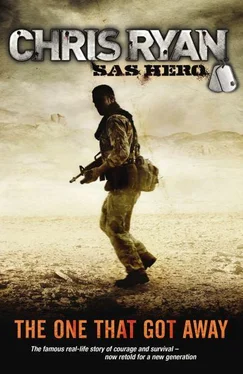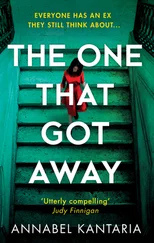This was ridiculous: home-made devices like that are crude, large and heavy, and we had no room to carry them. Later, however, we did make a single claymore out of plastic ice-cream cartons, and one of us took it in his bergen.
In the end we were given a mixed load of stuff by the Special Boat Service: five claymores, a box of L2 grenades, a box of white phosphorus grenades and some 66 rockets. We shared out some of this with the other two patrols, and I myself finished up with one L2 grenade and two white phosphorus.
We were also missing pistols. The twenty pistols packed and shipped for our own use simply disappeared, nicked for the other squadrons. The result was that the only man in our unit with a pistol was a guy called Vince, who had brought it with him from ‘A’ Squadron. We also asked for silenced pistols, and in particular for the make invented during the Second World War for Special Operations Executives. Although fairly basic, these have never been surpassed for sheer quietness — no more than a pfft — and at close range the 9 mm slug is deadly. The other two squadrons had such weapons and, as things turned out, there were several moments when I could have done with one.
We were also missing other basic equipment. Take the maps, for instance. The only maps we had were really poor and designed for air crews. Their scale (1:250,000) was so small that they showed few details. They might have helped navigators, but they were no good to people on the ground. To back them up, we badly needed satellite information, but we were told that no satellite imagery was available.
The first escape maps we were given had been printed in 1928, then updated for the Second World War. At the last minute, though, we were issued with newer ones, printed on silk, which we worked into the waistbands of our trousers.
Each of us was given a photocopied note, in Arabic and English, promising £5,000 to anyone who handed over a Coalition serviceman to a friendly power. Deciding the document was rubbish, I threw mine away. Later, however, I changed my mind; because I couldn’t speak Arabic, I thought I’d better have a note after all. So I got another member of the patrol, Bob Consiglio, to photocopy his, and I took that with me. We also signed for twenty gold sovereigns each, in case we had to bribe somebody or buy our way out of trouble. Of course, we were supposed to return these after the conflict, but not everybody did.
The patrol’s main task would be to man the OP, but we knew we might also have to blow up fibre-optic communication lines. Luckily one of our lads knew about fibre-optic cables. He told us that we needed a particular device, like a metal detector, for tracing them. We asked for one immediately. He also knew that if a cable is cut, the operators can tell where the break is. We therefore decided that, if we did blow a line, we would put anti-personnel mines around the break, so that when engineers came to repair it they would be taken out. We would also lay another delayed-action device to blow the line again later. But the main aim of the exercise would be to kill as many skilled personnel as possible. If we managed to kill the first wave coming out to make repairs, it was a good bet that the next lot would say they couldn’t find the break, and the line would remain cut.
Bravo Two Zero was to be commanded by Sergeant Andy McNab. Andy was then about thirty-two, a Cockney Jack-the-Lad with such a gift of the gab that he could talk his way out of any situation. Dark-haired, with a moustache, he’d done a lot of work in the Regiment and was a good demolitionist.
Paired off with Andy — which meant he shared bed-spaces, vehicles, cooking equipment and so on — was Dinger, a lance corporal of twenty-eight who’d been in the Parachute Regiment. A bit of a wild character, he was always game for a fight. If you described anyone as mad, or as a joker, it would be him. Yet he was also a good family man, married with two daughters.
The other sergeant was Vince, an older man, about thirty-five, a medic like myself, who tended to be a bit nervous and twitchy in his movements. He was tall and slim, with an athletic build; he had fuzzy, dark-gingery hair and a drooping, Mexican-type moustache. He came from Swindon, and was married with three children. He was putting a bold front on things, but I knew his heart wasn’t in this operation. Only a few days before, we’d sat on his camp-bed and he’d said to me, ‘I don’t want to be doing this.’
We discussed things a bit, and I said to him, ‘Well, now that we’re here, we’d better just get on with it and hope we’ll come out OK at the end.’ I got the impression that he wanted to finish his time in the army and be done with the whole business.
A closer friend of mine was Trooper Bob Consiglio. Twenty-four years old, the son of a Sicilian father and an English mother, he was very small (only 5 foot 5 inches — or 1.65 metres) but incredibly strong, with a heart like a lion. He was a really nice lad, and would do anything you told him to. He was a hard worker and a cheerful character. When it came to fighting, Bob wasn’t frightened of anything. I said to him one day, ‘Bob, if anything happens when we’re in there, make sure you stick with me.’ It wasn’t that I didn’t trust him to do anything by himself, though I did want to protect him, almost as if he were a brother. Rather, because he was so brave, it would be to my own advantage to have him close.
Twice Bob’s size was Stan — a different character entirely. He was over six foot tall (1.8 metres plus), not that obviously muscular, but very, very strong, well-spoken and a gentleman. Nothing ever seemed to bother him; whatever happened, his voice kept the same tone, and he just got on with things. If he had a fault, it was that he was too nice. He was another good mate of mine, and I wouldn’t have liked to see him get angry, because he could be a formidable fighter.
The other two members of the patrol were Legs Lane — so called because he was tall and thin — and Mark, a keen New Zealander who had joined the squadron only a month before. Both were very quiet, but they were good men, and Mark especially was always game for anything. Legs was a key man in the patrol as he was carrying the 319, the main radio set.
Finally there was myself: a Geordie from near Newcastle, aged twenty-eight, and a corporal. During six years in the regular SAS I’d gained a good deal of useful experience in many countries, and at the beginning of 1991 I was physically the strongest I’d ever been, because during my last tour with the SP team I’d hit the weights and built up a lot of muscle on my upper body. The extra strength had been useful, because in the SP team you’re forever going up ropes or sliding down them, climbing into buildings, carrying guys, jumping off vehicles, pushing people away or restraining them. In all this, you’re handling a lot of weight. In your black kit, you have your body armour, Kevlar helmet, and waistcoat loaded with ammunition, stun grenades and axes, besides your machine gun and pistol. My weight had gone up from 11 to 12½ stone — that’s from about 70 kilos to nearly 80 kilos. Little did I know that the extra muscle was going to save my life.
In our last days at Victor we were busier than ever. Andy was getting the demolition kit sorted. I saw to the medical packs, Legs Lane to the radio. Everyone scrounged ammunition. We were told that when we moved up to Al Jouf — a Regiment Forward Operating Base (FOB), in an airfield in the northwest of Saudi Arabia — we would go more or less straight over the border into Iraq. Everything had to be ready before we left. We were told to leave all our non-essential kit behind.
On the evening of 18 January we flew to Al Jouf in three Hercules transport planes. On board were all the squadron vehicles and stores. The air war was then at its height, raging for the third night, and there was quite a high risk of being shot at en route. The sky was full of armed warplanes, all trying to blow the opposition out of the air.
Читать дальше












